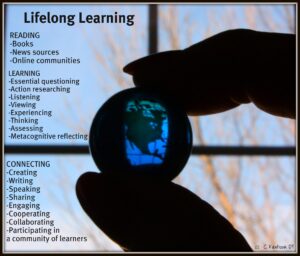Alexandra Kerr; Chelsea McMullen; and Natasha Mehay
Learning is the most natural human instinct, and in a rapidly changing world, each individual has a personal challenge to remain adaptable, flexible, and versatile. Equally, “[everyone] has a personal challenge to recognize [their] own greater potential and [their] ability to achieve it, this can be done through motivating [themselves] to learn continuously” (Longworth, 2003). Adult learners are not immune from the need or desire to learn more. According to Longworth (2003), individuals may want to enrich themselves in their personal lives by developing new skills or improving old ones. Individuals may want to improve their performance and salary at work or they may want to give themselves and their families a better quality of life. Regardless of motive, Longworth (2003) suggests that lifelong learning is:
- For everybody throughout life, from cradle to grave, from hatch to dispatch, about making progress at work, about more enjoyable leisure, and a better quality of life – all those things which encourage individuals to live up to their own potential.
- About continuously acquiring new knowledge, skills and understanding.
- About learning in a variety of new ways in which individuals can focus on their own needs, circumstances and preferred ways of learning.

Lifelong learning is comprehensive, and demands a greater level of understanding and knowledge compared to what is taught in educational systems today. The application of these new lifelong learning skills requires a level of self-reflection that inspires an individual to determine the areas where personal growth is needed.
Super Learners – Qualitative Learning
We all learn all of the time. But the quality of learning, and the way it is applied in the outside world, is what makes the difference between the learner and the super learner.
Image Attribution
“Lifelong Learning” by Carol VanHook is licensed under CC BY-NC-SA 2.0

